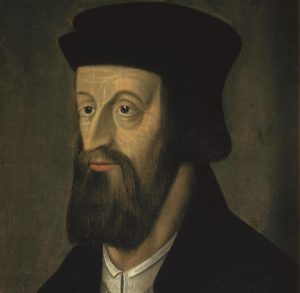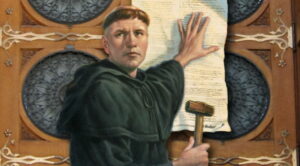Daniel 11:30a. and they come in him boats Kittim and he is sore and he returns and he menaces on covenant of holiness and he does and he returns and he shall have an understanding on ones forsaking of covenant of holiness. (Hebrew direct translation)
Daniel 11:30b. For the ships of Chittim shall come against him (the Little Horn power); therefore, he shall be grieved, and return and have indignation against the holy covenant: so shall he do; he shall even return, and have intelligence with them that forsake the holy covenant. (Hebrew/English translation)
Daniel 11:30 begins a new era in church history and this is the start of the Reformation.
Ships in this verse is in the plural. So after we have defined what ships mean in prophecy, we can find out who they refer to. Ships in the Hebrew is “tsiyim”. The following texts imply that the Hebrew word “tsiyim” means warships or ships of affliction.
Isaiah 33:21 But there the majestic Lord will be for us. A place of broad rivers and streams, in which no galley with ores will sail, nor majestic ships pass by.
Numbers 24:24 But ships shall come from the coasts of Cyprus, and they shall afflict Asshur and afflict Eber, and so shall Amalek, until he perishes.
Ezekiel 30:9 On that day messengers shall go forth from Me in ships to make the careless Ethiopians afraid, and great anguish shall come upon them, as on the day of Egypt; for indeed it is coming!
The texts from Numbers and Ezekiel suggest that it is God who sends these ships to inflict punishment on His enemies. These ships of affliction, are guided by men whom God uses to discipline all those who oppose Him.
Why ships instead of armies?
Armies have a direct approach with many thousands of soldiers. They attack and annihilate the object at one time.
However, warships are few in number and come quietly and secretly to their enemy, and can make a surprise attack.
Where do these warships come from?
From the harbor city of Kittim. Kittim is identified with the inhabitants of Cyprus because its ancient capital was named Kiton. This was the last trading harbor before reaching Israel.
OK! These ships are symbols of the few heralds of the Protestant Reformation who are few in number and come quietly and secretly to their enemy before they are discovered. For example:
John Wycliffe 1329-1384.
First English reformer known as the “Morning Star” of the reformation. He was a member of the Roman Catholic Church. He was an English scholastic philosopher, theologian, Biblical translator, reformer and seminary professor at Oxford University.
Johan Huss 1374-1415.
Bohemian reformer (province of Czechoslovakia). He was a member of the Roman Catholic Church and was a priest and philosopher. He did his Masters at Charles University in Prague.

Martin Luther 1483-1546.
German reformer. He was a member of the Roman Catholic Church. He was a priest, a monk and became Doctor of Theology at Wittenberg University.
Ulric Zwingli 1485-1531.
Swiss reformer. He was a member of the Roman Catholic Church and attended the Universities of Vienna and of Basil. He became a pastor.
John Calvin 1509-1564.
French reformer. He was a member of the Roman Catholic Church and was educated as a humanist lawyer and became a theologian and pastor.
What did all these reformers and many more have in common?
They read the Holy Bible for the first time and a new world opened up to them. They understood that amidst the corruption of the church which they were against, there was a loving God up in heaven who wanted to be acquainted with them personally. They found out that God is not an abstract God: a God who lives up in heaven and makes contact with them at the altar every time they have communion. They found out that when they believe in him as their personal savior, he lives in everyone’s heart always. Now this was a new teaching. They also discovered that the Pope is not the head of the Church, but Jesus Christ is, Ephesians 5:23 For the husband is head of the wife, as also Christ is head of the Church. They also found out that we are not saved by works and the purchasing of indulgences, but by faith in Jesus Christ. Ephesians 2:8 For by grace you have been saved through faith, and that not of yourselves, it is a gift of God.

What else did they find out?
The Holy Bible tells us about the plan of salvation for every being on this earth through texts like:
Romans 3:23 “for all have sinned and fall short of the glory of God.” This means that all men are sinners and no one is perfect. There are no exceptions. The pope is a sinner. All the priests in the Catholic Church are sinners. All ministers in the Protestant churches are sinners. Every man and woman on earth is a sinner. What does God do with all sinners who live in sin?
Romans 6:23 “For the wages of sin is death.” Sinners who willfully sin do not come to heaven, but die with all the ungodly on earth. How are we rescued from a life in sin?
John 3:16 “For God so loved the world that he gave his only begotten son, that whoever believes in him shall not perish but have everlasting life.” Therefore, we should believe in Jesus Christ as our only savior. There is no other name under heaven whereby we can be saved. Acts 4:12. The Pope and the priests cannot save us, only Christ can save us.
When we realize that we are sinners in God´s eyes, what shall we do? We shall repent of our sins. Acts 2:38 Peter, when he preached on the day of Pentecost and the people asked, what shall we do? He said “Repent, and let every one of you be baptized in the name of Jesus Christ for the remission of sins; and you shall receive the gift of the Holy Spirit.” After we have repented of our sins we should come to God and ask for forgiveness of our sins as stated in 1 John 1:9 “If we confess our sins, He is faithful and just to forgive us our sins and to cleanse us from all unrighteousness.” This means that no matter what sin we have committed, God will forgive us if we come to him personally and ask him for forgiveness. When we believe in Christ as our only personal savior, repent of our sins and ask for forgiveness of our sins, then we have peace with God.
Romans 5:1 “Therefore having being justified by faith, we have peace with God through our Lord Jesus Christ.” What does this peace include? There is no condemnation for sins from God.
Romans 8:1 “there is therefore now no condemnation to those who are in Christ Jesus.” When we have experienced this process of salvation through Jesus Christ, we become born again Christians. Jesus said speaking to Nicodemus in John 3:5 Jesus answered, “Most assuredly, I say to you, unless one is born of water and the Spirit, he cannot enter the kingdom of God.” To repent of sins and be born again, means that you have chosen a new way of life: to live like Jesus Christ when he was on earth. This includes helping people and spreading the good news of salvation only through Jesus Christ.
This is the message that these reformers preached to their congregations through the literary writings of the Holy Bible. In fact they translated the Holy Bible into the language of the people in their own land.
(Walker 250[1]). Indulgences: Only Popes and Bishops gave out indulgences. Huss and Luther condemned the sale of indulgences.
(Lyon 269[2]). An indulgence guaranteed the crusader against heretics and all believers’ entry into heaven and reduce or abolished time in purgatory.
(Lyon 333). Under Pope Sixtus there was a need for greater amounts of money in the form of gifts which led to the peddling of indulgences.
(Lyon 360). Luther nailed 95 theses on the doors of the church in Wittenberg condemning the sale of indulgences and the theology of indulgences. Luther says it is unwarranted by scripture. It encouraged men in sin and tended to turn their minds away from Christ and God´s forgiveness. Luther says we are justified not by our deeds but by our faith alone. Luther denied the supremacy of the Pope and the infallibility of general councils.

(Lyons 372). The reformers rejected the authority of the pope, the merit of good works, indulgences, the mediation of Mary and the saints, and all the sacraments which had not been installed by Christ. They rejected the doctrine of transubstantiation, the view of the mass as a sacrifice, purgatory, prayers for the dead, private confession of sin to a priest, and celibacy of the clergy.
(Lyons 373). The reformation argued that there was no precedent in the early church for priest as mediator (between man and God). The reformers believed in the priesthood for all believers. What is purgatory? Medieval people had a very real dread of and the punishment in purgatory – – .
The church taught that before they reached heaven they had to be cleansed of every sin committed in mortal life, in purgatory´s pains. (A place before one reaches heaven). An indulgence assured the shortening of the punishment to be endured after death in purgatory.
As a result of the reformation, the papacy in Dan 11:30 shall be grieved, and return and have indignation against the holy covenant – – -.
The word, “grieved” in Hebrew is “nikah” and gives a broader meaning of being disheartened, cowed, draw back timidly, abstain, downhearted and subdue[3].
The word, “indignation” in the Hebrew is “zaam” and means to blame, hostile in speech, denounce or curse, moved by mingled anger and scorn or feeling of injured innocence[4].
The word, “understanding” in the Hebrew is “yaben” and means to discern, become separated, distinct, observe, consider and understanding with cunning[5].
The papacy experienced the meaning of all these words and then turned upon those who proclaimed the new gospel message. As a reaction to these reformers, the papacy called them heretics, and called them before tribunals of the church to get them to recant and if they refused, they were condemned to the fire. The papacy understood the method in dealing with Protestants and that was burning them to death in fire and setting them as an example to their neighbors and friends by saying this what happens to heretics. Many recanted and joined the Church again, however even more refused and were burnt at the stake.
[1] Williston Walker, A History of the Christian Church (Edinburgh: T & T Clark, 1963)
[2] Tim Dowley, Ed., A Lion Handbook: The History of Christianity (Herts: Lion Pub., 1977)
[3] Francis Brown, S.R. Driver and C.A. Briggs, A Hebrew and English Lexicon of the Old Testament (Oxford: Clarendon Press, 1980), 456.
[4] Ibid, 276.
[5] Ibid, 106.



